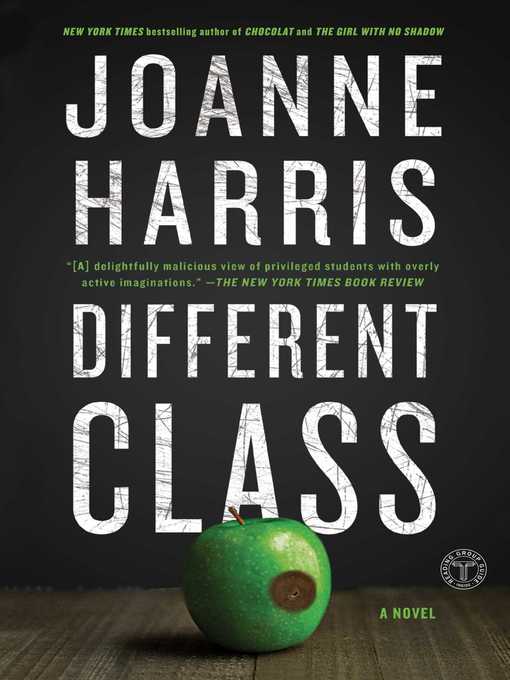
Different Class
A Novel
کتاب های مرتبط
- اطلاعات
- نقد و بررسی
- دیدگاه کاربران
نقد و بررسی

November 28, 2016
Roy Straitley, the narrator of this tepid psychological thriller from Edgar-finalist Harris (Gentlemen and Players), teaches Latin at St. Oswald’s, a British boys boarding school. He favors those he terms his Brodie Boys, a gaggle of misfits much like him. Interspersed with Straitley’s account (which is set in 2005) are 1981 journal entries of an unnamed St. Oswald’s boy addressed to a frenemy nicknamed Mousey and flashbacks to a 1981 incident that resulted in the arrest of teacher Harry Clarke, a friend of Straitley’s, for sexual misconduct and something far worse. Straitley is shocked to learn that someone involved in that 1981 incident, Johnny Harrington, who was then a somewhat troublesome St. Oswald’s student, has been appointed the school’s new head. Straitley, whose old-fashioned ways aren’t appreciated by the progressive new administration, finds himself politely being shown the door, though he’s positive something more sinister is going on. Harris doles out information painstakingly slowly, to the point of irritation, despite a fascinating milieu and important social issues. Agent: Peter Robinson, Rogers, Coleridge & White (U.K.).

November 1, 2016
Mr. Chips meets Gordon Gekko in Harris' (Peaches for Father Francis, 2012, etc.) novel of academe.Roy Straitley is a relic of the English prep school past: he's taught Latin at St. Oswald's Grammar School for Boys for decades and otherwise leads a celibate and austere life in his nearby flat, his only luxuries being licorice candies, Gauloise cigarettes, and strictly moderate alcohol intake. But lately St. Oswald's is in turmoil. A new headmaster, Johnny Harrington, has arrived, flanked by consultants and spouting modern theories of branding, political correctness, and trigger warnings, to effect the academic equivalent of a corporate takeover. Smooth, impeccably turned-out Harrington manages to co-opt the school's older faculty by deluding them into thinking they have a future in the new St. Oswald's. Instituting the contradictory motto Progress Through Tradition, Harrington replaces the Honors Boards--large placards lining the school's corridors "inscribed with the names of our old boys"--with glossy advertising posters, imposes coeducation, and promulgates an anti-bullying policy that protects bullies. But most disturbing to Straitley, the new regime's only dissenter, is the fact that Harrington is a graduate of St. Oswald's who, without actually being implicated himself, was at the center of an incident in 1981 which led to the prosecution of a gay English teacher, Straitley's best friend, Harry Clarke, for pederasty and murder. Now Harrington seems bent on banishing Straitley to the bleak underworld of involuntary retirement unless the old Latin master, armed with Roman political savvy, can upset the smarmy new head's overly polished apple cart. Interspersed with the present narrative, set in 2005, are diary excerpts from a nameless St. Oswald's student, written mostly circa 1981, addressed to Mousey, a boy from the slums whom he once tried to kill. In addition to describing the torture and drowning of animals, the diarist confesses to jealously acting out in a horrific way when his crush on Harry Clarke goes unrequited. Harris expertly manipulates reader expectations as to the identities of St. Oswald's true villains, past and present. A gripping fictional expose of a tempest no teapot can contain.
COPYRIGHT(2016) Kirkus Reviews, ALL RIGHTS RESERVED.

December 1, 2016
The third in Harris' absorbing trilogy set in the fictional town of Malbry, takes up where the award-winning Gentlemen and Players (2006) left off. St. Oswald's Grammar School for Boys has had its share of scandal recently, and rumpled classics teacher Roy Straitley would like nothing more than for things to get back to normal. Unfortunately, the school's new headmaster is bent on change. The new headmaster is also a former St. Oswald's student who always struck Straitley as a disagreeable young man. Chapters alternate between 2005 and Headmaster Johnny Harrington's school days in 1981. Chapters include unsigned letters from each time period in which the writer confesses that you can use Coca Cola to clean up blood spills and that rats are too small to make good sacrifices. As the book proceeds, the reader becomes less and less certain who is writing these letters but more and more convinced that the revelation cannot come without a thumping good showdown. And Harris delivers.(Reprinted with permission of Booklist, copyright 2016, American Library Association.)

























دیدگاه کاربران